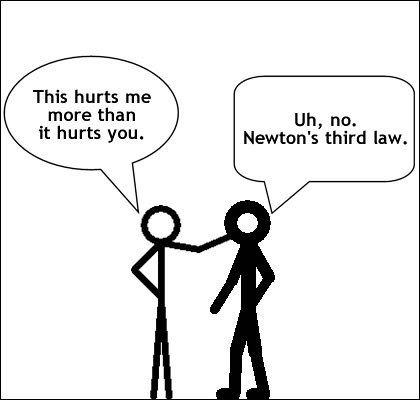
Posted on 10/07/2011 9:35:53 PM PDT by neverdem

Thirteen years ago, two teams of astronomers and physicists independently made the same stark discovery: Not only is the universe expanding like a vast inflating balloon, but its expansion is speeding up. At the time, many scientists expected that the gravitational pull of the galaxies ought to slow down the expansion. Today, researchers from both teams shared the Nobel Prize in physics for that dramatic observation, which has changed the conceptual landscape in cosmology, astronomy, and particle physics.
Half of the $1.45 million prize will go to Saul Perlmutter of Lawrence Berkeley National Laboratory and the University of California, Berkeley, who led the Supernova Cosmology Project. The other half will be shared by Brian Schmidt of the Australian National University in Weston Creek, who led the High-z Supernova Search Team, and Adam Riess of Johns Hopkins University and the Space Telescope Science Institute in Baltimore, Maryland, who worked on High-z. "I'm really happy for them," says Yannick Mellier of the Institute for Astrophysics of Paris. "It's a huge discovery that has impact in all of physics."
Both teams traced the expansion of the universe back through time using stellar explosions called type Ia supernovae. Because all such supernovae explode with essentially the same brightness, astronomers can use them as "standard candles": They can tell how far away a supernova is by measuring its apparent brightness from Earth. They can also tell how long ago the stellar bomb went off by measuring how much its light has been stretched to longer, redder wavelengths by the expansion of space. Using different supernovae, both teams found that the expansion of the universe was accelerating. "We thought we must be making some mistake," Schmidt says. "But the mistake refused to go away."
Other evidence soon bolstered the case for the accelerating expansion and some sort of "dark energy" to power it. A few years later, measurements of the afterglow of the big bang—the so-called cosmic microwave background—indicated that 70% of the stuff in the universe had to be dark energy. Studies of clusters of galaxies show that their growth has slowed over the 14-billion-year age of the universe, as if space-stretching dark energy were impeding it.
Cosmologists, astrophysicists, and particle physicists must still explain what "dark energy" is. Much effort focuses on how the density of dark energy changes as space expands. If dark energy is an inherent part of space, the density should remain constant. If dark energy is something in space, then it should become more dilute. The question comes down to using further astronomical observations to determine whether a single parameter in the cosmological "equation of state" is exactly -1, indicating dark energy is part of space, or something like -0.93, indicating that dark energy is something in space. Currently, the value of this parameter is consistent with -1 with an uncertainty of about 10%.
Will scientists ever know what dark energy is? "That's not a sure thing," says Simon White of the Max Planck Institute for Astrophysics in Garching, Germany. "The problem is that you can't prove by observations that a parameter is exactly minus one."
Each team comprised about 20 scientists. "This is another example of what a shame it is that the Nobels can't recognize teams," says Martin Rees of the University of Cambridge in the United Kingdom. "It sends the wrong signal." White notes that Robert Kirshner of Harvard University was the thesis adviser of Schmidt and Riess and got them started on the prizewinning project.
With reporting by Daniel Clery.
Incidentally, I've always been puzzled by Einstein's apparent assertion that gravity was not really a force, because modern physicists treat it as a force and look for its "force carrier" particle, the graviton.

We have no empirical evidence measuring the behavior of light waves over large distances and time. If it takes ten billion years for the effect to occur, it might be too small for us to currently measure. Our theories are incomplete, this much is known. If our expansion is to continually increase, our time will slow down, our mass will increase and the rest of the Universe will be essentially accelerated black holes. If it is actual speed we are measuring.
If we were already inside an event horizon, it would explain a lot of what is observed (lensing, the “wall of galaxies”, etc). :’)
We lose either way.
It’s the background quantum field.
It was never compressed by anything else, it’s a phenomena due to the emergence of the particles.
Just like popcorn becomes “compressed” in the bag if it’s in the microwave. As the bag fills, it becomes more and more “compressed”.
The same way the popcorn expands the bag, the quantum field “compresses” the universe and “poofs it up”.
It’s just a continuation of the big bang, which is still going on.
If you use the Planck units to compute the density of the universe it works out to like ten with 109 zeros after it, grams per cubic centimeter.
Disclaimer: Opinions posted on Free Republic are those of the individual posters and do not necessarily represent the opinion of Free Republic or its management. All materials posted herein are protected by copyright law and the exemption for fair use of copyrighted works.